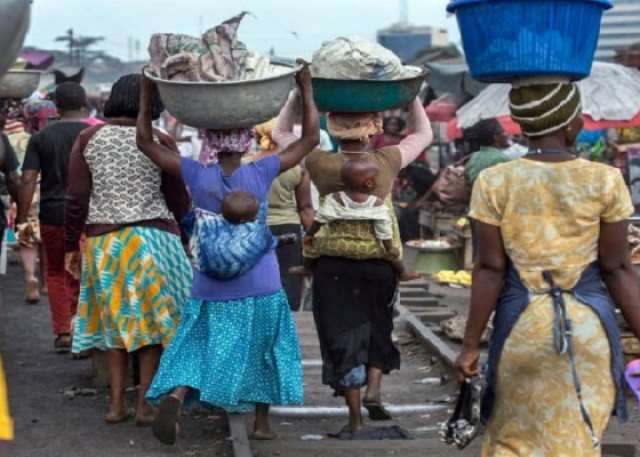- by andrews-adunkwah
- February 9, 2024
Click the link below to join Our WhatsApp group for daily brief on current trends in the country.
Join Here!
Loading

Kayayoo, also known as Kaya, is a female porter. Generally, the head porters have migrated from rural communities to urban cities in Ghana in search of work.
Originating from the compound “kaya” in the Hausa language, meaning “load, luggage, goods, or burden,” and “yei” in the Ga language, signifying “women or females,” kayayei represent a diverse group of young girls, usually between 14 and 16 years old, who relocate from other areas especially the northern parts to urban centers like Accra, Kumasi, and Takoradi.
Here, they engage in various occupations such as head load carrying, informal trading, domestic assistance, and other menial jobs, with aspirations ranging from saving for marriage dowries to funding education or starting small businesses upon returning home.
In an interview with RGGNEWS, Ubaidah Abubakar, shares her life story, a testament to resilience and hope.
Ubaidah is a Kayayoo, one of the many female porters who carry heavy loads for market-goers in exchange for a meager income at Madina Marrket.
Ubaidah, now 22, hails from a small village in the Northern Region of Ghana. Her family, like many in the region, struggled with poverty. “We didn’t have much,” she recalls, her voice steady yet tinged with the weight of past hardships. “Education was a luxury we couldn’t afford. I had to find a way to help my family.”
At 16, Ubaidah made the decision to leave her home and move to Accra. The capital city, with its promise of opportunities, drew her in. “I heard stories of people finding work and sending money back home. I wanted to do the same,” she explains. Her journey was fraught with uncertainty and fear, yet she was determined to change her family’s fortunes.
Upon arriving in Accra, Ubaidah found herself in Madina Market, where she quickly learned about the life of a Kayayoo. “It was hard at first,” she admits. “The loads were heavy, and my body wasn’t used to the strain. But I had no choice. I had to survive.” Despite the physical demands of her job, Ubaidah was undeterred. She carried goods for hours on end, earning just enough to sustain herself and send a small amount back to her family.
According to her, initially the highest amount she received for carrying a load was 5 cedis, but now that amount has increased and she occasionally receives tips as well.
Ubaidah’s day starts at 5 a.m. She prepares a simple breakfast, often just a piece of bread and some water, and heads to the market. “The mornings are the busiest,” she says. “People come early to buy fresh produce. That’s when I make the most money.” She weaves through the narrow pathways of the market, balancing loads on her head with a grace that belies their weight. Her eyes, alert and focused, scan the crowd for potential customers.
The life of a Kayayoo is not without its dangers. Ubaidah faces the constant threat of harassment and exploitation. “There are times when people refuse to pay after I’ve carried their goods,” she reveals. “Or they try to take advantage of me because I’m a woman.” Yet, she remains undaunted. “I’ve learned to stand up for myself. I’ve become stronger.”
Despite the challenges, Ubaidah finds moments of joy and solidarity among her fellow kayayei. “We look out for each other,” she says with a smile. “When someone is in trouble, we come together to help.” This sense of community provides a lifeline in the often harsh environment of the market.
Looking ahead, Ubaidah dreams of a better future. “I want to save enough money to start my own business,” she shares. “Maybe a small shop where I can sell goods. I want to provide for my family and ensure my siblings get the education I missed out on.” Her determination is palpable, a beacon of hope amid the uncertainty.
As the sun sets and the market begins to quiet down, Ubaidah’s day ends. She heads to her modest living quarters, exhausted but hopeful. “Every day is a step closer to my dream,” she says, her eyes reflecting a resilience forged in the fires of hardship.
Ubaidah Abubakar’s story is one of many in Madina Market, yet it stands out for its testament to the human spirit’s ability to endure and aspire.
Amid the clamour and chaos, she carries not just the physical loads of the market, but the weight of her hopes and dreams. And in every step she takes, she moves closer to a future she is determined to shape.

Click the link below to join Our WhatsApp group for daily brief on current trends in the country.
Join Here!
0 Comments: